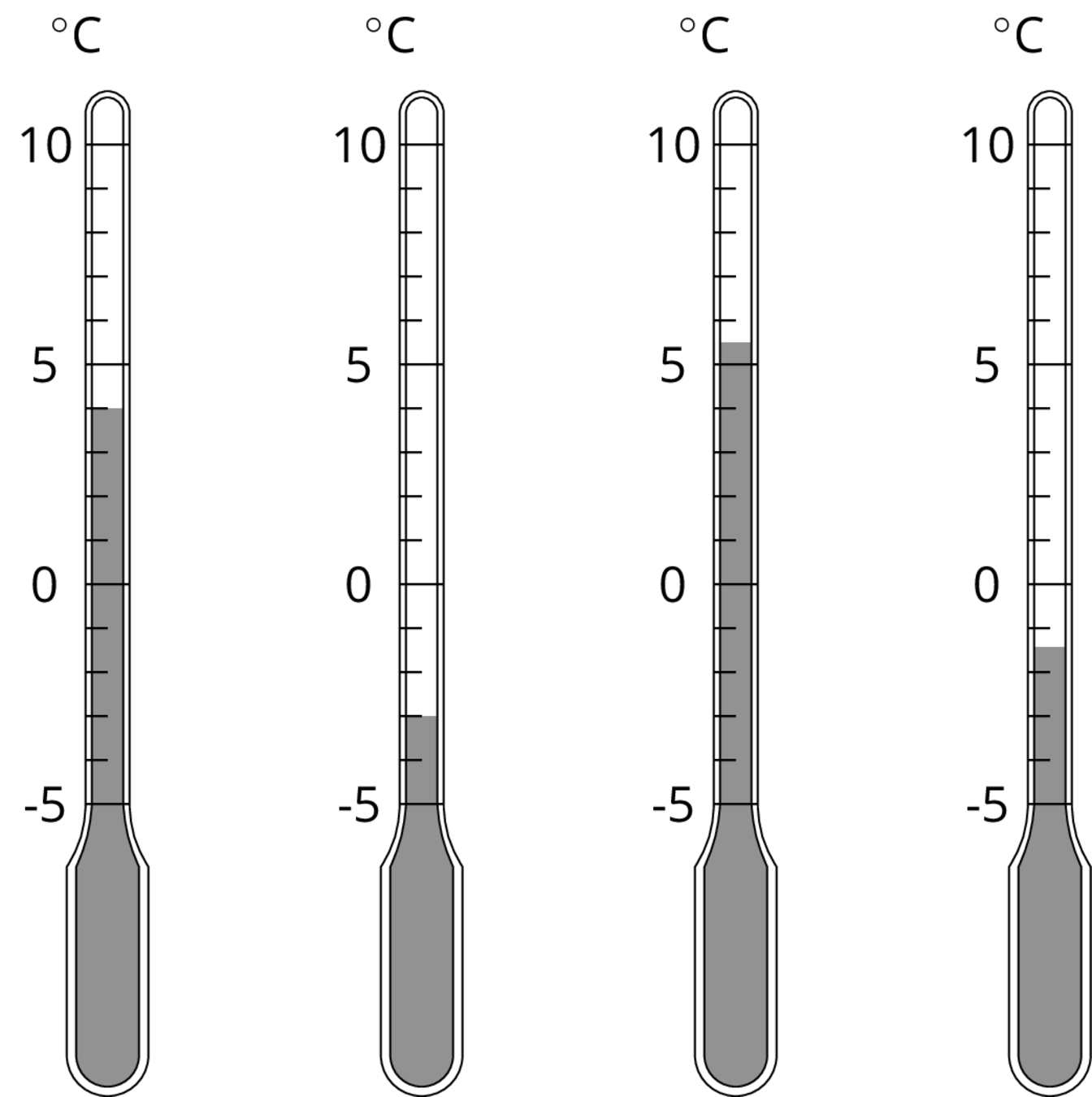Lesson 1
Interpreting Negative Numbers
Let's review what we know about signed numbers.
1.1: Using the Thermometer
Here is a weather thermometer. Three of the numbers have been left off.

- What numbers go in the boxes?
- What temperature does the thermometer show?
1.2: Fractions of a Degree
-
What temperature is shown on each thermometer?
- Which thermometer shows the highest temperature?
- Which thermometer shows the lowest temperature?
-
Suppose the temperature outside is \(\text{-}4^\circ \text{C}\). Is that colder or warmer than the coldest temperature shown? How do you know?

1.3: Seagulls Soar, Sharks Swim
Here is a picture of some sea animals. The number line on the left shows the vertical position of each animal above or below sea level, in meters.

-
How far above or below sea level is each animal? Measure to their eye level.
-
A mobula ray is 3 meters above the surface of the ocean. How does its vertical position compare to the height or depth of:
The jumping dolphin?
The flying seagull?
The octopus?
-
An albatross is 5 meters above the surface of the ocean. How does its vertical position compare to the height or depth of:
The jumping dolphin?
The flying seagull?
The octopus?
-
A clownfish is 2 meters below the surface of the ocean. How does its vertical position compare to the height or depth of:
The jumping dolphin?
The flying seagull?
The octopus?
-
The vertical distance of a new dolphin from the dolphin in the picture is 3 meters. What is its distance from the surface of the ocean?
The north pole is in the middle of the ocean. A person at sea level at the north pole would be 3,949 miles from the center of Earth. The sea floor below the north pole is at an elevation of approximately -2.7 miles. The elevation of the south pole is about 1.7 miles. How far is a person standing on the south pole from a submarine at the sea floor below the north pole?
1.4: Card Sort: Rational Numbers
- Your teacher will give your group a set of cards. Order the cards from least to greatest.
- Pause here so your teacher can review your work. Then, your teacher will give you a second set of cards.
- Add the new set of cards to the first set so that all of the cards are ordered from least to greatest.
Summary
We can use positive numbers and negative numbers to represent temperature and elevation.
When numbers represent temperatures, positive numbers indicate temperatures that are warmer than zero and negative numbers indicate temperatures that are colder than zero. This thermometer shows a temperature of -1 degree Celsius, which we write \(\text{-}1^\circ \text{C}\).

When numbers represent elevations, positive numbers indicate positions above sea level and negative numbers indicate positions below sea level.
We can see the order of signed numbers on a number line.

A number is always less than numbers to its right. So \(\text{-}7 < \text{-}3\).
We use absolute value to describe how far a number is from 0. The numbers 15 and -15 are both 15 units from 0, so \(|15| = 15\) and \(| \text{-}15| = 15\). We call 15 and -15 opposites. They are on opposite sides of 0 on the number line, but the same distance from 0.
Glossary Entries
- absolute value
The absolute value of a number is its distance from 0 on the number line.

The absolute value of -7 is 7, because it is 7 units away from 0. The absolute value of 5 is 5, because it is 5 units away from 0.
- negative number
A negative number is a number that is less than zero. On a horizontal number line, negative numbers are usually shown to the left of 0.

- positive number
A positive number is a number that is greater than zero. On a horizontal number line, positive numbers are usually shown to the right of 0.
